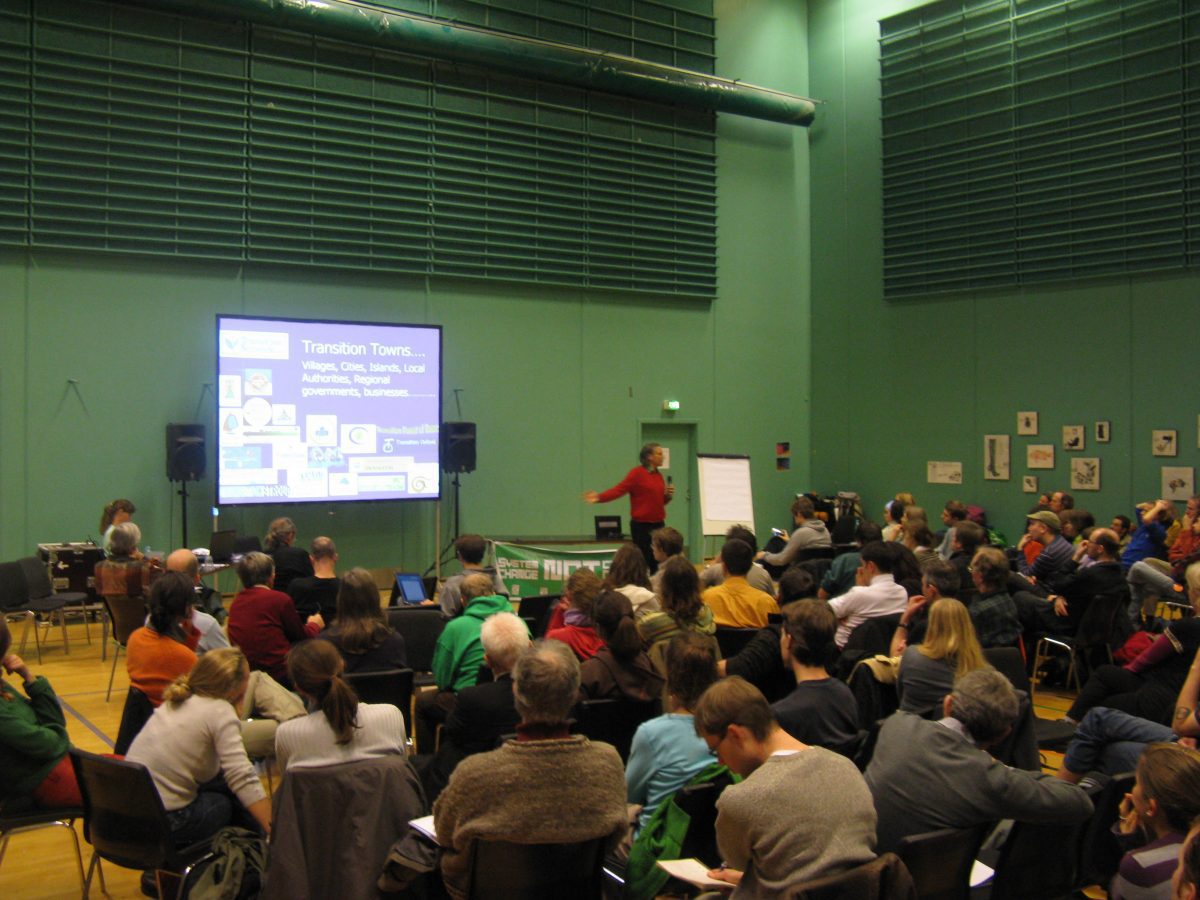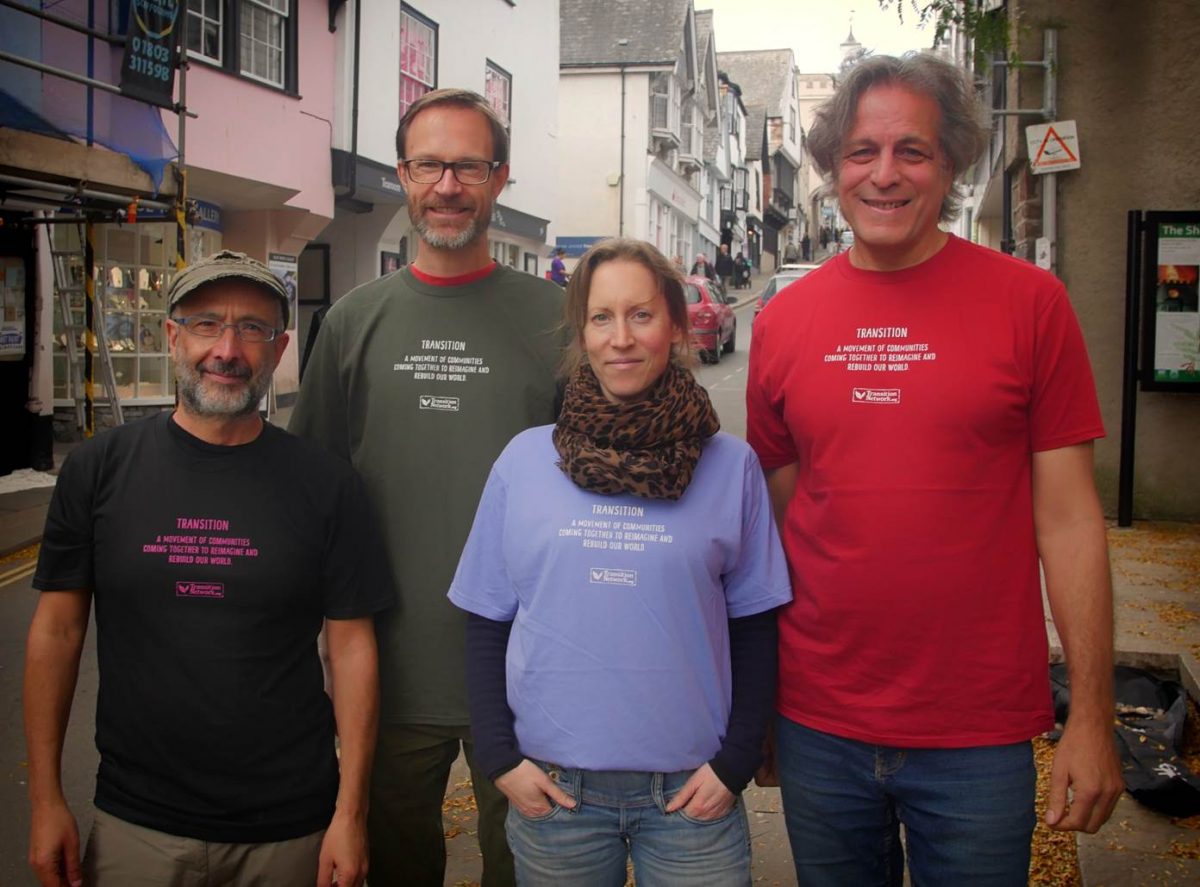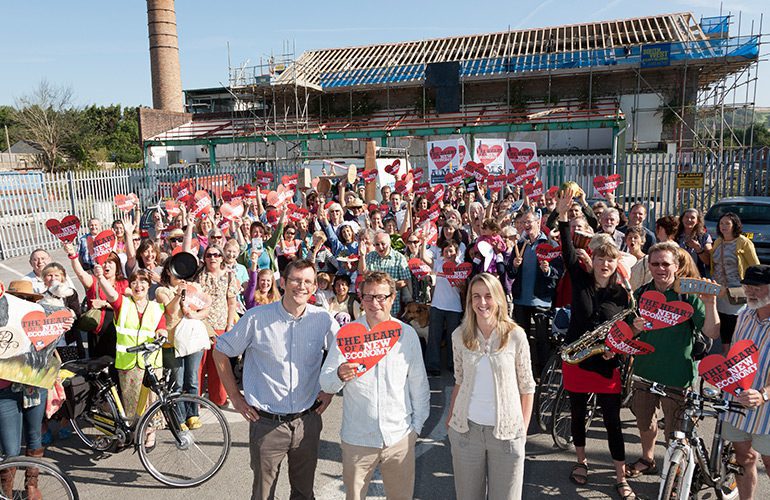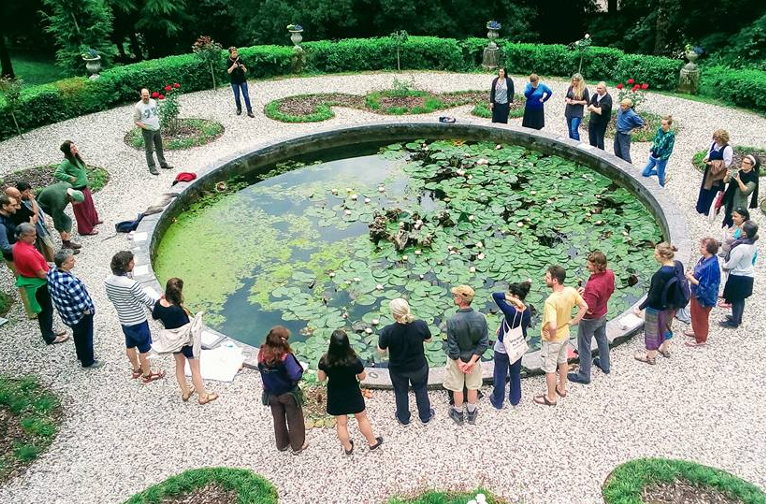Naresh Giangrande, a co-founder of Transition Town Totnes and Transition Network and, until recently, our Training Coordinator, shares some personal reflections about the Transition movement’s impact and potential. We know that many people around our movement are currently asking similar questions in these turbulent times. Naresh offers one perspective and we are keen to create space for other experiences and views to be shared as part of a broad and deep conversation about where next for the Transition movement. We encourage you to post comments to help get this conversation started!
The scale and pace of destruction caused by the world economy is accelerating despite the efforts of grass roots movements to create change and new directions. Right now, I see no realistic scenario for altering our frightening inability to catalyse meaningful change; it’s time we had one!
Transition proposes that by creating better ways of living today we can, through that process, create a better tomorrow. Millions of bottom up, grass roots organisations and initiatives worldwide are creating the world they want, in their place, in diverse ways. Transition is part of an ecosystem of change. While this ecosystem of change has undoubtedly changed many places for the better, many decades of intense and impressive grass roots work (over twelve years of Transition) have not altered the trajectory of the Industrial Growth Society towards a regenerative culture. This post asks why, whether it is even realistic to think that it might have, and what might have to happen to create change on the scale needed.
The Transition process and practice can be summed up in Sophy Bank’s three questions that Transitioners ask:
-
- If we look fearlessly at the issues facing us what do we see?
- ‘What is the best my town/village/ city can be?’ What would that look like?
- What concrete, practical things can we do right now to make that vision a reality?

The Transition model and process delivers what it is fundamentally designed to do:
-
-
- It engages people in an inspirational way using each of our creative abilities.
- It allows large numbers of people to exercise their ability to take action in ways that make a difference.
- It works at a scale at which we can make a difference, ie. locally.
- We can start to create the world we want now.
- It rekindles community wellbeing.
- Transition manifests, in tangible ways, our love for the world.
-
While change at a local level has created practical pieces of a regenerative culture; what an initiative that has emerged from the Stockholm Resilience Centre called seeds of a Good Anthropocene, we have failed to significantly and measurably move the big picture. We, the big We, are failing. I see grass roots movements as part of our collective cultural global system-wide process of movement towards a regenerative culture. We cannot do this alone. We need more We.
What is Failing?
By any yardstick we have failed to:
-
-
- Lower Carbon emissions
- Create an economic system that respects earth limits
- Create a society that generates economic equality and social justice.
- Increase biodiversity
- Reduce pollution
-
 Estimates of how the different control variables for seven planetary boundaries have changed from 1950 to present. The green shaded polygon represents the safe operating space. Source: Steffen et al. 2015 Courtesy of Stockholm Resilience Centre
Estimates of how the different control variables for seven planetary boundaries have changed from 1950 to present. The green shaded polygon represents the safe operating space. Source: Steffen et al. 2015 Courtesy of Stockholm Resilience Centre
After over ten years of working at the heart of the Transition movement I feel we need to ask why and, ‘What can be done to have more impact?’
I am not diminishing or disrespecting the tremendous efforts and extraordinary achievements which have been demonstrated daily by Transition (and other grass root initiatives) groups around the world. It is indeed impressive and inspiring. Our lack of impact is not for want of effort, imagination, or creativity. Transitioners embody those qualities in bucket loads.
I am writing this as a reflection and an enquiry. I hope that by questioning our assumptions and beliefs, we can find the next steps to creating change to a regenerative culture. It is my hunch that we are still in the early stages of co-creating a movement that can truly disrupt our current unsustainable pathways, and create systemic change. In the early days of Transition we often talked about how we maybe knew the A-C of Transition. Twelve years on have we gone beyond D or E? I believe many more steps and processes, presently unthinkable alliances and initiatives are needed to enable the next steps in an effective movement to a regenerative culture.
Grass roots movements for change on their own are clearly not going to be enough to create the system warping, seismic shifts necessary to create the change we need. But could some new form of cooperation between citizens, governments, and business be effective? If so, how might that happen? This post will look at the problems and issues facing the Transition movement (and most grass roots initiatives), of which there is little discussion. I am hoping that reflecting on our problems will enable us to be clearer and more focussed on ways to create the conditions for an emergent regenerative culture.
 Transition workshop COP15 Copenhagen, photo Sophy Banks
Transition workshop COP15 Copenhagen, photo Sophy Banks
The issues we face as grass roots Movements for Change
From my time working with Transition groups all around the world, I have seen these issues present in just about every Transition group. They lead me to ask whether we are working in the right way, or whether we are asking the right questions, or working in a way that will ultimately produce change, or whether the structure of the Industrial Growth System somehow prevents fundamental systemic change. Here are some of the main stumbling blocks.
1) Grass roots movements are starved of resources
Time and money are the most important. We rely on volunteers, in many parts of the world these are disproportionately older volunteers, because they have the time due often to the lightening of responsibility for pursuing a career, raising a family, and making money. The young people we most need are often time and money poor. I have lost track of the number of young people who have asked me how to be involved and still make enough money to pay the rent.
Most Transition groups struggle to fund basic enabling structures such as web sites, an office, meeting space, admin support. You can do a lot without money, but without significant resources most Transition groups hit a limit to their effectiveness. Key people burn out due to the scale and sheer work needed to build alternative structures like cooperatives, raise significant investment capital, or just maintain a transparent, democratic organisation. To get the scale of change that will shift the current system we need organisations, power, and clout – and that takes money in the current paradigm.
Enabling structures are important. Transition hubs like Transition US or Transition Brazil help connect and support Transition groups operating in particular territories. However, Transition Hubs, with rare exceptions, can’t find funding, and the international organisation is also under funded. There are no clear pathways to adequate funding. Government funding is being squeezed and in most places is unavailable, which leaves either charitable trusts or creating a trading arm. Neither of these will provide the funding necessary to catalyse and support scalable change.
The main theoretical underpinning of grass roots change, Strategic Niche Management (SNM) and Transitions Management proposes that change often emerges through small scale experiments which can develop and adapt in ‘protected niches’ and then, as the dominant system starts to collapse, can seed and inform what comes next. This is a perfect description of a social change technology like Transition. However, for a whole lot of reasons, social change is one of the most difficult dimensions of change to influence. Cultural, social, and economic constraints and assumptions prevent change happening in this sphere. And given the change we need is technical, social, political, cultural, and psychological, it becomes a very hard gig.
Grass roots change makers are creating the soil from which the future survival of our culture, species, and life on earth will emerge. Business leaders, politicians, and big philanthropic organisations who know the trouble we are in and the scale of change needed should be stepping up. They should be providing us with the skills, support, finance, and knowhow to quickly and reliably explore and scale up viable alternative ways of living and working. They are not. Why Not? Most philanthropy is targeted at ameliorating the worst effects of current systems, rather than change to the system. We work in conditions where we are hampered and lack what we need to succeed. After over ten years my question for change makers is, Why do we put up with this lack of support and recognition? And the question I have for mainstream society and business (who have the resources), is Why are so few willing or able to make those resources available?
2) System change – who wants that?
Regulatory, political, and power structures are captured by the elites and multinationals who act to maintain and enhance their power, profits, and privilege. Why wouldn’t they? It’s the game, and, from my perspective, they appear to have no choice but to play the game. This leaves very little space for the systemic change needed – change we need on every level (personal, local, national, and international) and in the social, political, economic, and ecological spheres.
Transition and other grass roots initiatives lie outside the Overton window which is where the change we need is going to come from. But there are costs, as well as freedoms, to operating in the wilderness. You have lots of freedom to challenge the unchallengeable and say the unsayable. And one of the costs is that it is hugely difficult to be heard. So the deal is, if you are operating outside of the Overton window, you have to do it without adequate resource using your wits, ingenuity, creativity, and passion. You can move fast and fail quickly. Success, if achieved, will be a rudimentary proof of concept. Scaling up, popularisation, mass uptake, and all the cultural shifting that go with it needs more than a proof of concept. It needs resources and organisations.
If we take, for instance, the change needed to our economic systems, business, even innovative business, it will not get us to where we need to go. Systemic change of the economic system is outside the scope of any business or even business sector. To survive in business you have to play by the fundamental, foundational rules of business. Sure, technical change is part and parcel of the economic system, but only within a narrow, market friendly range of possibilities. Unfortunately, many progressive business leaders see the solutions we need emerging from business, which is unrealistic. It cannot and will not support the sort of systemic change we need. Capitalism is not, has not, and never will prioritise the health of people, eco systems, or life before profits. It can’t. But business – corporations – have all the resources, and change is not possible without those resources. Where are the partnerships between business, government, and radical grass root change organisations? Where are the radical businesses challenging the capitalist model?
Business people are usually very pragmatic. So where and how can the scale of change to our macro economic system emerge? Can you point to any examples? No! The profit motive will not get us to where we need to go. What will? It is time for business to set up well funded paradigm shifting divisions to explore what a paradigm shift that isn’t market driven, isn’t state run, and isn’t socialist, looks like, and design pathways to get there. We need you and you need us. Small scale innovations (created by the grass roots) won’t scale or outcompete the existing economic system, and it’s hard to see how they will emerge and challenge the macro economic system. Which leads me to the next point.
3) There isn’t yet a comprehensive, tried and tested alternative to the capitalist, growth dependent economic system
Why not?
There are many ways to buy food, energy, or other things. Innovation in local economics abounds. Yet, there isn’t an alternative to the market capitalism. By this I mean the big thing that sits atop the economic processes. That which demands constant growth. No country, since the end of communism, has tried out a different overarching economic system. There are proposals and ideas. However there are a few very big difficulties:
-
-
- Those in power won’t give it up easily. It will take a sustained, global political campaign.
- It is a huge system and even if something, some kind of steady state or gradual consumption reducing mechanism were introduced, it would have to be done at a scale that will be very difficult to implement without crashing the existing system. And the complexity of that is beyond my capacity for thought (think Brexit times an order of magnitude)
- It is hard to sell getting less, without getting more of something. This more of something might be consciousness, community, connection, wisdom, or love. I am not sure human kind is ready for the shift of consciousness which some advocate. Can you imagine most people opting for a less tangible set of aspirations?
- There may not be a way out of the continued growth civilisation project. We may have created a trap for ourselves, from which we can’t escape.
-
Out of our suffering we emerge. Our struggles are really our only hope. Bryant McGill
4) We have not placed the importance of Inner Change as centrally as outer change
I have learned in my time in the Transition movement, that one of our most unique and important contributions to the process of change is the alignment of inner and outer change. It might seem self evident, but the system is us. It is in us and unless those internal parts that keep the current system in place are actively and systematically challenged in us, they will run the same system, creating the same poor choices, and in effect making any change irrelevant. And that ‘new’ system will be just as oppressive and unable to confront the current realities as was the old system. What makes it pernicious is that it doesn’t seem like that at the beginning, or we think we have grown out of patriarchy or hierarchies, when we haven’t. The seeds of our venial nature are there and they will grow and mature unless we actively change.
Sophy Banks said to me one morning that she saw that one of the jobs of leaders in this movement of systemic change was to repeatedly chop off the head of our ego, day after day. In doing so, endure and model the shame and humiliation of exposing our shadows. This is the meaning of service.
One of the persistent challenges we face in is burn out and its handmaiden, despair resulting from unprocessed feelings. As the planet is burning, activists and those working outside of the system are burning out. We are unable to maintain our levels of activity. Within the system things are not much better, within the UK (population 60 million) there were 57 million prescriptions issued for psychological drugs in 2014 and rising each year.
Outer change must be accompanied by inner change. This simple fact is not acknowledged enough in Transition or other movements for change. Without inner change any positive change is coopted by the old system in ways that corrupt otherwise positive changes and uses those changes to further the aims of the old regime. Some examples that spring to mind are green growth, the happiness and well being movement being used by corporations to get more out of their employees, and renewable energy being used to promote more growth in the system. Maybe the connection between these examples and inner change may not seem obvious. Our lack of personal integrity and inability to self reflect and thereby examine ourselves lies at the centre of these betrayals.
5) We don’t operate at a scale that can create the scale of change needed
In 2014 Peter Haff introduced the term ‘technosphere’ to describe the technical apparatus that we are totally dependent on to stay alive. These systems are marvels of human cooperation which are unrivalled in human experience. They are in many ways the crowning achievement of our industrial society. These worldwide systems are at several levels of scale removed from our often local lives, where we have the agency to create change. Even the powerful players in each system are constrained. This is because no one is in change. There is no democratic oversight. These systems are effectively self organising, which is itself a miracle of cooperation. We are all utterly and completely dependent on these systems and are unable, so far, to create alternatives. We are not even in relationship with those systems except as passive consumers. Hence the difficulty in changing them. No relationship = no possibility of change.
Some of the systems I am referring to are:
-
-
- The global logistics and transport system
- The interconnected industrial manufacturing system
- The telecommunications and information system
- The electricity grids
- The financial system
- The mining and resource extraction system
- The media
- Criminals and outlaws including terrorists and off shore tax havens, and their flip side the criminal justice and international law enforcement agencies.
-
Interestingly we have managed to hack food systems, and energy to a lesser extent. And some building, fibre, and clothing, and literature and arts often are more open to change. Although most these are also often dominated by large global players. For instance 2-3 companies dominate the global food commodities system, although most of the world’s population is not fed by agribiz but by small local farms.
 Les Compagnons de la terre, Liege
Les Compagnons de la terre, Liege
The technosphere has become more powerful than governments and is seen as too big to fail. Being self organising, we cannot locate them, interrogate or hold their leadership to account, because there is no leadership. The farce of the latest ‘data breaches’ involving Facebook, and the charade of US government officials ‘questioning’ Mark Zuckerberg is one instance of this ‘dance of power’. Once the size, scale, and hegemony of the systems the technosphere is made up of is illuminated, virtually all politics and economics can be seen as interactions and tensions between the different systems as they jockey for more power and influence. Most of what is reported in mainstream news is the tensions and power struggles between these systems. This is why (in my opinion) grass roots efforts are invisible. We are outside of these power struggles and deemed irrelevant, or at most ‘quaint’ or a throw back. I fear that we are trapped in multiple, technosphere bear hugs that make relocalisation an empty gesture. That is, of course, unless the failure of complex systems causes collapse. In a collapse scenario local alternatives will come into their own and act as lifeboats amid the ruptures and chaos that would ensue. Some authoritative voices are now arguing that near term collapse – within ten years – of our societies (in wealthy ‘developed’ countries) is now inevitable.
6) Our story isn’t yet clear.
Transition Network has done some great work defining the narrative of Transition:
Transition is…
A movement of communities coming together to reimagine and rebuild our world.
Story flow
A movement is building
Here are the things all the different people are doing in their communities
It’s rooted in caring for ourselves, each other and the living world
This shows a different future is possible when we come together
(Optional: This is why it’s needed)
Here’s how you can be part of it
It was a great start. I even had some T shirts printed up with these words.

A great story inspires and moves us. It begins with purpose and then how you will achieve that purpose. It’s simple, direct, easy to understand, and speaks to the fundamentals of life; love, peace, equality, connection, and fraternity. I have had great hopes of a good powerful story that many grass roots groups could use and even other players and power centres could buy into. All those protecting life rather than those protecting the patriarchal, empire based cultures need to be able to tell that story and inspire with that story, otherwise the old story, the one that got us here, will prevail. It’s that simple. But it will take some amount of work and testing to make this happen. NEON’s Framing the Economy work is a good start, along with the work of George Lakoff and Jon Alexander’s New Citizenship Project. Telling a story full of hope and optimism, which the Transition movement has done, can help build momentum for the scale of change needed. A new story, tested and retested, may be an important lever for massing a scalable movement for change.
Conclusion
We are failing to create the change needed to maintain life on earth as we know it.
Individual grass roots organisations alone are too small, and even a gathered together and fully coordinated bottom up movement for change (which as yet doesn’t exist) is probably still too weak and out of relationship with the technosphere and large economic structures to instigate systemic change.
It is hard to see how change will come from within the technosphere.
Any realistic hope of change to a life supporting culture will emerge from a dauntingly difficult and harrowingly unconceivable synergy between outer (physical, tangible) and inner (psychological and psychic) shifts; in a mosaic of alignment between hitherto often unrelated or antagonistic cultural elements- business, government, civil society, academia, faith groups, spiritual and personal development movements, and others.
While there are intriguing fragments of working models, we are not yet even close to knowing what this might look like. The Atmos project here in Totnes is an intriguing collaboration between business, civil society, and local government.
 The Atmos Project, Totnes, photo: David Pearson
The Atmos Project, Totnes, photo: David Pearson
Ungersheim, France is a creative partnership between local government and Transition to create systemic change. The Ctrl Shift platform I have been working on has brought together grassroots organisations who had never talked before. Ecolise, Smart CSOs, and the Covenant of Mayors are European examples of weaving together networks of networks, as are BALLE , and Smart Cities. The Municipalities in Transition project is another such network of municipalities who are working with grass roots organisations to create new forms of political and economic engagement. However all of these are not yet sufficiently developed to really challenge the dominant paradigm.
We created the technosphere. Our cultural stories, and our values and beliefs are human constructs. Just as they have been created they can be recreated, differently. Like I said at the beginning, we are currently failing to create the scale of change needed. I believe we have the power to. Where and how that power will emerge, I don’t know. But maybe a bigger We does?
We cannot understand the moral Universe. The arc is a long one, and our eyes reach but a little way; we cannot calculate the curve and complete the figure by the experience of sight; but we can divine it by conscience, and we surely know that it bends toward justice. Theodore Parker, American abolitionist 1853
This blog is in equal parts an expression of my fears for the future, a cry for help, a public confession of my personal feelings of failure, and a sharing of my learning and insights from years in the Transition movement. It is also a call to a tantalisingly close but still elusive way of living that is peaceful, just, harmonious, and accords all beings their full potential for life.
This blog asks many questions, and answers few, for that I apologise. I wish I had more answers, more hope, more optimism. Instead, all I can offer are more questions, an unvarnished assessment of movements for positive change, fears for the future, and large dollops of uncertainty. I still dream that some day before I die I can say with certainty to my grand children, ‘You have every chance of living full lives of peace, health, and happiness.’
Naresh Giangrande, Summer 2018





